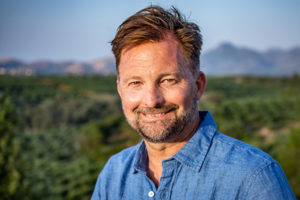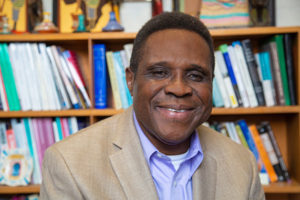Two Allegheny College Professors Receive Fulbright Awards to Teach and Conduct Research Abroad
Allegheny College Professors Christopher Bakken and Stephen Onyeiwu have received 2021–22 Fulbright U.S. Scholar Program awards to teach and conduct research in Greece and Nigeria, respectively. Each will return to a country that played a formative role in his development as a scholar and educator.
Bakken, the Frederick F. Seely Professor of English, has taught, written, and conducted research in Greece extensively during the past three decades; he has published five books drawing on his experiences there. Bakken’s poetry, nonfiction, reviews, and translations have appeared widely in the United States and abroad. His work has earned him, among many other honors, the T.S. Eliot Prize in Poetry, the McGinnis-Ritchie Award for Nonfiction from Southwest Review, the Willis Barnstone Translation Prize, and residencies at the Virginia Center for the Creative Arts and the International Writers’ and Translators’ Center of Rhodes.
Onyeiwu, the Andrew Wells Robertson Chair of Economics, was born in Nigeria and earned his bachelor’s and master’s degrees there. He has conducted scholarly research on African economies, resulting in numerous publications in both academic and mass media outlets. As one of the leading scholars on African economic development, Onyeiwu has served as a consultant to the United Nations Economic Commission for Africa (UNECA), United Nations Conference on Trade and Development (UNCTAD), and the Council for the Development of Social Science Research in Africa (CODESRIA).

During his Fulbright experience, which will run the full 2021–22 academic year, Bakken will teach creative writing and literature courses at Aristotle University of Thessaloniki, where he began his career as an educator in 1992. After earning his MFA in poetry from Columbia University, Bakken moved to Greece to teach English at a high school in northern Greece. Seeking to gain college-level teaching experience, he walked into the English Department at Aristotle University to introduce himself and ask if he could teach classes.
“Even though I had virtually no experience teaching at that level, and I probably looked like a madman, they took a risk and hired me,” Bakken said. “Thus, it was in Greece where I started my teaching career, and it was in Greece where I fell in love with teaching.”
Bakken will work on several literary projects while in Greece, including a new collection of poems. “Every time I try to predict what shape those poems will take in advance, I wind up being completely wrong — so I look forward to seeing what surprises the local muses have in store for me, as they did during my previous Fulbright,” said Bakken, who was a Fulbright scholar at the University of Bucharest in Romania in 2008.
As part of his Fulbright research, Bakken also hopes to continue a project translating the work of the Greek poet Titos Patrikios. In addition, Bakken plans to begin a nonfiction memoir about his first experiences in Greece 30 years ago, and he has set a goal of improving his Greek language skills through immersion and formal instruction.
Bakken said that, looking back on his childhood in Wisconsin, he could have never imagined then that he would pursue a creative profession “so profoundly inflected with my affection” for another country. And that the country would be Greece.
“I believe that this kind of cross-cultural intersection is appropriate to the aims of the Fulbright Scholar Program,” Bakken said, “and I appreciate the opportunity to continue finding my way to navigate between these two cultures while offering students in Greece what I can as a model of such profitable exchanges.”

During his seven-month Fulbright experience in Nigeria, Onyeiwu will teach two courses at Covenant University — Development Economics to graduate students and Introduction to Microeconomics to undergraduates.
“Nigeria suffers from brain drain more than any African country,” Onyeiwu said. “Because it has more universities than other African countries, it faces acute shortages of teaching staff.”
Onyeiwu said that he benefited from scholarships from the Nigerian government while earning his bachelor’s and master’s degrees. He wants to give back to the country by teaching at Covenant, one of the leading private universities in Nigeria.
“Fulbright is a perfect fit for me because its mission aligns very well with my project,” Onyeiwu said. “As an agency within the State Department, Fulbright and its sister organizations like the USAID and the Peace Corps help promote U.S. foreign policy objectives. In Africa, those objectives include growth, prosperity, democracy, and human rights.”
Onyeiwu’s Fulbright research will investigate the role of technological innovation in Nigeria’s economic growth — a topic that previous studies have not explored, he said. He will collaborate on the project with Covenant University Professor Evans Osabuohien.
“As an undergraduate student in Nigeria, I often wondered why Nigeria has not become a high-income country, despite its abundant resources,” Onyiewu said. He found it to be perplexing that resource-poor countries in East Asia have been able to achieve high growth rates and structural transformation, while Nigeria is still grappling with slow economic growth, high poverty rates, and inequality. Asked Onyeiwu: “Could innovation and technology be the keys that unlock Nigeria’s untapped potential as the giant of Africa?”
Osabuohien and Onyeiwu’s project will involve gathering data on Nigeria’s economic growth, identifying factors influencing that growth (including science and technology), and surveying researchers, scientists, and officials at Nigeria’s science and technology institutes and agencies. Osabuohien and Onyeiwu expect to produce two journal articles from the research.
After Onyeiwu returns to Allegheny from his Fulbright, he plans to introduce a senior seminar on Technology and Economic Development in Africa. He is hopeful that his Fulbright experience will enrich his courses at Allegheny and advance Allegheny’s strategic goal of internationalization.
Onyeiwu expects his visit will be the beginning of a mutually beneficial relationship between Allegheny and Covenant in areas such as faculty-student exchanges and study abroad. “As a teacher-scholar, I cherish Fulbright’s support for teaching and research,” he said, “and its emphasis on impactful projects that support long-term relationships between the awardee and the host institution.”
The Fulbright Program is the flagship international educational exchange program sponsored by the U.S. government and is designed to forge lasting connections between the people of the United States and the people of other countries, counter misunderstandings, and help people and nations work together toward common goals. Since its establishment in 1946, the Fulbright Program has enabled more than 390,000 dedicated and accomplished students, scholars, artists, teachers, and professionals of all backgrounds to study, teach and conduct research, exchange ideas, and find solutions to shared international concerns.
The Fulbright Program is funded through an annual appropriation made by the U.S. Congress to the U.S. Department of State. Participating governments and host institutions, corporations, and foundations around the world also provide direct and indirect support to the Program, which operates in more than 160 countries worldwide.